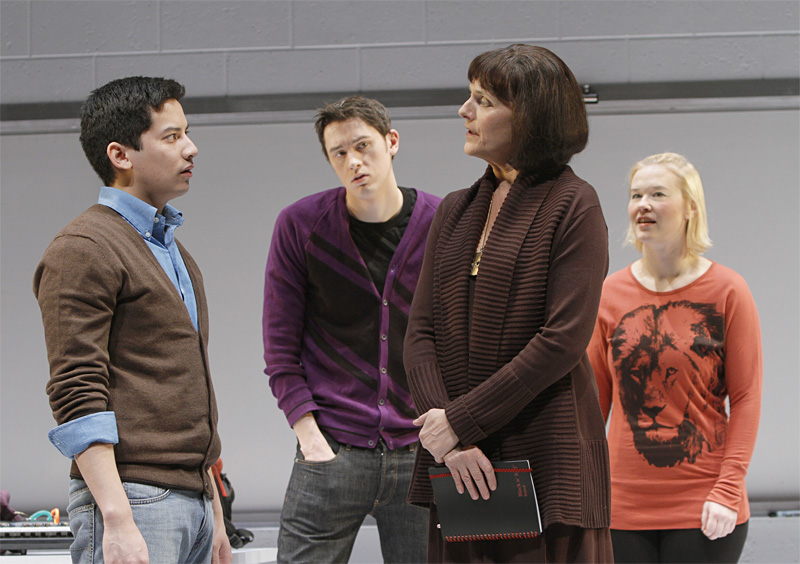Stephen Karam’s self-acceptance play takes us to a Nerdland we’ve visited many times before—in Napoleon Dynamite, Juno, Freaks & Geeks, The Opposite of Sex, et al.—but updated with IM and PowerPoint. Through the fellowship of a speech and debate team, three teen misfits find the nerve to fully embrace their dorky differentness as one of them tries to expose a sex scandal in their school.
There are many funny one-liners, but the plot is so multiply fractured that dramatic focus goes out the window. This is storytelling in the grazing age of YouTube; it’s less fun for anyone seeking sustained tension and a well-earned climax. It was first staged on college campuses.
See if you can follow this: When a teacher (Amy Thone) rebuffs closeted sophomore Solomon’s proposal for a student-newspaper article about another teacher having sex with students, Solomon (Justin Huertas) blackmails golden boy Howie (Trick Danneker)—who in turn blackmails prima donna artiste Diwata—into joining Solomon’s cause. In return, Solomon has to agree to join Diwata’s speech and debate team and Howie’s gay-straight alliance.
Most of the scenes are devoted to the construction and servicing of these agreements via shakedowns and coercion. Other scenes show the S&D team “building” toward some sort of self-compromising musical performance along the lines of the one playwright Karam experienced 16 years ago, when he fearlessly sang “The Last Night of the World” from Miss Saigon in front of his large public high school. The equivalent showpiece here is an earnest and energetic interpretive dance number to George Michael’s “Freedom.”
Danneker’s Howie is the most consistently natural and well-acted character. The others, including the usually reliable Thone, sometimes anticipate lines rather than listening, and veer intermittently into broad caricature. This schtickiness is underscored by cartoonish directing (or writing) which cuts the lights at charged personal moments.
Speech and Debate celebrates the do-it-yourself amateurism of hand-drawn overhead-projector graphics and Garage Band, and I appreciated that these kids were using modern technology to subvert authority and be themselves. But the climax felt like a cliché and the denouement trailed off like the memory of a Web-surfing session. Whereas Solomon arrives at his predictable destination, the others, including the perp, evaporate like yesterday’s supporting arguments.








